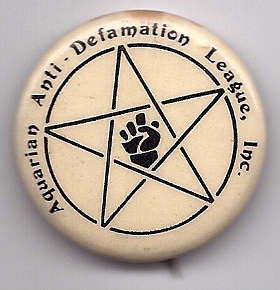There’s been a little flurry of activity today in our neighborhood of blogosphere about the question of whether Neopaganism is a expostmodern religion. I’ve been mulling this over since I read Drew Jacob’s and Star Foster’s take on it hours ago; the comment I was composing became so long, I thought I might as well blog about it, too.
Drew puts forth some very stimulating talking points on what will be needed by spiritual communities to survive in our techno-saturated world. Star focused particularly on the ideas that physical meetings will become less relevant as blogging, podcasting, and social media interactions fill that niche.
She isn’t entirely comfortable with that conclusion, and neither am I. Certainly, the digital world is powerful and inescapable. I quite agree with the idea that those spiritual service providers who do not participate digitally will be marginalized. But will we be losing something in the process?
Joseph A. Moody, in the very first comment on Star’s blog, asked the provocative question about how the the written word had an impact on religious and spiritual life, and what could we learn from that? In fact, writing did change things a lot. People did not have to remember stuff, they could look it up when they needed it. This meant, of course, that it was not internalized in the same way it would be in a strictly oral culture. This is why the the Druids, it is popularly thought, did not write out their religious material because only unimportant stuff should be written down. If it was important, you memorized it.
A little more recently, we can look at what happened in the late 1980s and through the 1990s, when there was an explosion of books published on Pagan topics, including famously (or infamously) Scott Cunningham’s Wicca: A Guide for the Solitary Practitioner and Silver RavenWolf’s To Ride a Silver Broomstick. These books were (and still are) immensely popular, and for better or worse changed the Wicca/Witchcraft/Pagan community, by regularizing the idea of the solitary as a path unto itself and popularizing the idea that you could learn everything you need from books.
What we face-to-face fossils have been struggling with ever since is conveying the idea that however valid the book experience may be, it is not the same as the f2f experience. A self initiation may be a moving and powerful experience, but it is not the same moving and powerful experience as an initiation into an initiatory lineage. Please note, I am not placing these on a hierarchy or a scale, only pointing out that they are each different experiences. They are not interchangeable experiences. And if that’s what’s available to you, that’s what’s available.
My argument has been with those who have other opportunities, but do not bestir themselves to take it. Many folks–I’m remembering reading (*snort,* yeah, I read, too) it from Robert Anton Wilson, but I’m sure there are many others–have emphasized that reading an exercise is not the same as doing an exercise. Reading a ritual is not the same as doing a ritual. Reading an initiation rite is not the same as getting initiated. Reading about sex is not the same as…well, you get the picture.
(I just realized I may be hopelessly dating myself merely by discussing initiation as if it were important and relevant!)
Now we’re all online. As other blog comments mentioned, an online rite is not the same as a f2f rite, but if that’s all you’ve got available, go for it. But do not think it is the same experience as a f2f rite. Typing and reading engage brain parts that are different from those you would be using in a f2f ritual.
A podcast ritual is another step farther away. I used to see Catholic masses broadcast on TV, but that was a pale experience compared to what I knew about being in church where you had not just the sights and sounds, but the smells, the tactile experiences, and the energy of being in a group. It’s different. Still, I treasure having been able to see the ADF podcasts of Isaac’s memorial. But it is not the same as if I had been able to be there.
Most troubling to me, as it was to Star, was this idea:
Sermons or other routine scheduled meetings will not be effective. Less people will want to commit to a physical meeting on a regular basis.
I can’t help thinking that is just sad. ‘Cause I don’t see people giving up, say, bowling night or going out to the bar or gaming night or dating on a regular basis. There is something about those experiences that call for repetition in real life. With religion and magic, as with a relationship, you’re going to get out of it what you put into it.
When I was at Florida Pagan Gathering the week before last (a wonderful f2f experience) I spent some time with Aaron Leitch, a practitioner of an art even more arcane than mine, Solomonic magic. You know, that stuff within the musty old grimoires where you have to spend six months to do a ritual, and half of that is time spent finding or making all the arcane supplies you need to do it. He called that quest magic. It is a process you take yourself through, finding out about yourself along the way. The quest makes the magic.
That is an example is an active participation in your own spiritual life, and a heck of a lot more profound than merely receiving information. I would shudder to think that just as the publishing boom led so many to believe they’d experienced it all that way, that the digital revolution would merely encourage another kind of passive consumerism.
But just to be on the safe side, I’m all over this digital thing.


